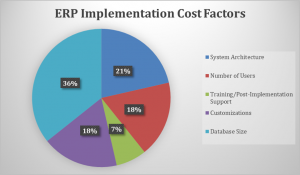How Much Does ERP Implementation Cost?
To migrate or not to migrate? That is not always the question.
Typically, the deciding factor surrounding whether or not a company upgrades, migrates from a legacy system or goes with a straight up fresh ERP implementation is the cost. This total cost generally includes software licenses, renewal fees, customizations, data migration or conversion (where applicable), training, upgrades and post-implementation support.
While every business is unique, and there is no magic formula for calculating an exact price for an ERP implementation, we break down all of the major factors that determine why an implementation can cost as little or as much as it does.
- System Architecture: Some ERP systems are simply costlier to customize and implement due to their design, advanced features offered and out-of-the-box modules being provided by the vendor. Most “all-in-one” solutions that bundle multiple features could also be costlier than using just a specific ERP feature.
- Number of Users: Naturally, the more users you have, the higher the license cost will be. Additionally, users mean workstations, and the higher the number of users and workstations you have will increase implementation costs.
- Training/Post-Implementation Support: Pretty self-explanatory. Assume that if it’s a fresh implementation, the amount of training will increase with a new system, versus an upgrade to a system that your team has been using for a period of time. Since the core of the accounting functionality really won’t ever change, the impact on cost regarding training and post-implementation support really depends on the level of comfort the users have employing the software.
- Customizations: The more applications and customizations you need, the more the implementation will cost. Some industry verticals will have more complex requirements. For example, an accounting firm will likely need fewer applications and customizations than a chemical manufacturer. In addition, there could be discounts in using cloud applications over on-premise options. According to Gartner report “Market Share Analysis: ERP Software, Worldwide, 2016”, it was noted that in 2016, many ERP vendors moved their model to software-as-a-service (SaaS) and offered discounted migration services or lower subscription pricing. These incentives pushed many hesitant, but willing customers to upgrade to SaaS or replace their solution.
- Database Size: If you’re using an older, proprietary system or several disparate systems, it could cost more to migrate your business data to the new ERP system. However, this may be an upfront cost that could be recovered in the long term. Conversely, the cost to simply upgrade a proprietary/existing system still depends on the size of the database and the health of the data itself. Whether all historical data or just a year or two are required as part of the migration, health and size matter.
What now?
Your financial management and accounting applications are one of the most critical components of your business infrastructure. Switching to a new accounting system can seem overwhelming, but it doesn’t need to be. View this on-demand webinar to learn the best practices for implementing ERP and more importantly—how to avoid the pitfalls.
Have specific questions or ready to get more information? Schedule time with one of our ERP experts to get informed, review your options and get a personalized implementation quote.
Stay in the Loop
Subscribe to get all our latest content sent directly to your inbox!





